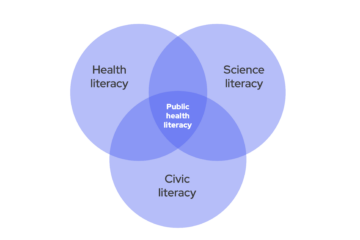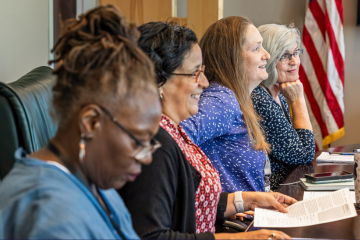In state and local health departments across the country, workers find themselves in an “all-hands-on-deck” situation in the COVID-19 response. These public servants are the ones who do things like help us understand and control disease outbreaks. They help community members understand how actions like social distancing can keep some safe and healthy, but not others (such as workers in the gig economy and individuals who are homeless). They have committed their professional lives to making populations — our neighborhoods, communities, localities, and states — safer, healthier, more equitable, and thriving.
Many public health professionals have been preparing for and responding to COVID-19 for months. And for years, they have trained and prepared for epidemics and pandemics. The intensity and gravity of this work, coupled with the uncertainty about how this crisis will affect them their families and our population, surely has an impact on their mental health.
For these public servants and all people, mental health is especially important during a crisis of this magnitude. For anyone looking to equip themselves to weather the COVID-19 storm, here are some strategies that may be useful. These activities may or may not bring immediate results, but every action can lead to increased peace and calm even in the midst of chaos and uncertainty.
Guided Meditations or Calming Talks
Dr. Tara Brach is a PhD-trained psychologist who also has expertise in Eastern spiritual practices. She offers useful mindfulness and compassion practices to manage the fear and uncertainty surrounding this current situation. She offers a pandemic care package and livestreams a weekly class on Wednesdays at 7:30 p.m. ET. The class begins with a 30-minute guided meditation followed by a one-hour talk. She can be found on YouTube and Facebook as well as on her podcast, Tara Brach.
Simple Tools to Develop Resiliency in Trying Times
The Center for Creative Leadership shares simple tools to practice resilient and mindful leadership, both of which are critically important in a time of crisis. As a few examples, they have articles on three simple strategies to build resiliency, four mental health habits to deal with stress and burnout, and how to hone skills as a mindful leader.
Online Communities to Discuss Challenges and Process Feelings and Emotions
Many companies are opening their hearts and Zoom platforms to create opportunities for people to connect. One such company is Adaptive Change Advisors, whose weekly Zoom conversations focus on “Leading Through Uncertainty.” These meetings can be accessed on Zoom. The Human Systems Dynamics Institute is hosting daily 20-minute calls to support “Adaptive Action Inquiry on the Wicked Issues of COVID-19.” In these short but impactful sessions, individuals connect and one individual shares a “wicked” problem. Together the participants explore unexpected solutions and learn and adapt in the moment. The calls take place every weekday from 11 a.m. to 11:20 a.m. ET.
Meditation Practice
It’s never too soon or too late to start a meditation practice. Meditation is simply the practice of bringing awareness to the present moment. Jon Kabat-Zinn, a scientist, writer, and meditation teacher — and founder of Mindfulness Based Stress Reduction at the Center for Mindfulness in Medicine, Health Care, and Society at the University of Massachusetts — began his meditation journey while a graduate student with his colleagues Daniel Goleman (author of Emotional Intelligence) and Richard Davidson (at the Center for Healthy Minds, University of Wisconsin-Madison). In this talk, “Mindfulness, Healing, and Wisdom in a Time of COVID-19,” Kabat-Zinn provides words of wisdom, the opportunity to practice meditation, and reminders that there is no “wrong” way to quiet the mind.
Other Resources
In times of crisis, people often stop to reassess their lives and what life means to them. The Greater Good Science Center website can help people gain clarity and insight about what a meaningful life means for them. Some people find that taking a break to find meaning makes them more resilient. One particularly relevant resource is four things we can do every day to support our mental health: move, eat healthy meals, connect with others, and “be” and not just “do.” This website also provides inspiration for those looking for something but not sure what that is yet.
Eckhart Tolle, author of A New Earth: Awakening to Your Life’s Purpose, is considered one of the great spiritual teachers of our time. In this short clip, Tolle talks about Transcending Fear. For more from Tolle, watch his video series, “Staying Calm in the Face of Adversity.” His calm, clear, and focused nature helps to bring people the sense that everything is going to be OK and that opportunities exist even in crises.
These and other strategies can improve mental health and help people equip themselves for the uncertain road ahead.
Your Tips
How are you managing stress during this time? Send us an email or tweet and tag us @deBeaumontFndtn.





